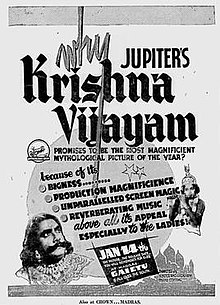Krishna Vijayam
| Krishna Vijayam | |
|---|---|
 Theatrical release poster | |
| Directed by | Sundar Rao Nadkarni |
| Written by | Velavan Karmayogi |
| Screenplay by | Sundar Rao Nadkarni |
| Based on | Epic Krishna Leela |
| Produced by | M. Somasundaram Mohideen |
| Starring | N. C. Vasanthakokilam P. V. Narasimha Bharathi T. Premavathi R. Balasubramaniam A. L. Raghavan Lakshmiprabha M. R. Santhanam Lalitha Padmini |
| Cinematography | P. Ramasamy |
| Edited by | Sundar Rao Nadkarni |
| Music by | S. M. Subbaiah Naidu C. S. Jayaraman |
Production company | |
Release date |
|
| Country | India |
| Language | Tamil |
Krishna Vijayam (transl. Krishna's victory) is a 1950 Indian Tamil language film written and directed by Sundar Rao Nadkarni. The film featured Carnatic music singer N. C. Vasanthakokilam in the role of Narada. The film, based on the Epic story of Krishna avatar, featured later day playback singer A. L. Raghavan as the child Krishna. Adult Krishna was played by P. V. Narasimha Bharathi.[2]
Plot
The film is about the epic story of Krishna, an avatar of Lord Vishnu. The story is about his birth, elimination of his uncle, the King Kamsa and his boyhood leelas with gopikas.
Cast

- R. Balasubramaniam as Kamsan
- Master A. L. Raghavan as Young Krishna
- P. V. Narasimha Bharathi as Radhakrishnan
- S. A. Natarajan
- N. C. Vasanthakokilam as Naradar
- T. Premavathi as Radha
- M. S. S. Bhagyam
- M. Lakshmiprabha
- Dance
Production
A. L. Raghavan was contracted with Baala Gaana Vinodha Sabha, a theatre troupe. Somasundaram Chettiar of Jupiter Pictures, impressed with his singing and acting prowess, decided to cast him as the younger Krishna in Krishna Vijayam, and gave ₹5,000 (US$63) to the theatre troupe to terminate Raghavan's contract with them. This was in 1946, when Raghavan was 13 years old.[3]
Soundtrack
Music was composed by S. M. Subbaiah Naidu and C. S. Jayaraman. Lyrics were penned by Papanasam Sivan, T. K. Sundara Vathiyar, Bhoomi Palakadas and K. P. Kamakshi. Singers are N. C. Vasanthakokilam, A. L. Raghavan & K. S. Angamuthu. Playback singers are T. M. Soundararajan, Thiruchi Loganathan, S. S. Mani Bhagavathar, P. Leela, K. V. Janaki, T. V. Rathnam & T. R. Bhagirathi.
The music for "Navaneetha Kannaney..." was scored by C. S. Jayaraman and the lyrics were written by K. P. Kamakshi. T. M. Soundararajan sang his first song "Radhey Nee Ennai Vittu Pokaathadi".
| No. | Song | Singer/s | Lyricist | Duration (m:ss) |
|---|---|---|---|---|
| 1 | "Navaneetha Kanna" | N. C. Vasanthakokilam | K. P. Kamakshi | |
| 2 | "Eppadi Sakippadhu" | Thiruchi Loganathan, S. S. Mani Bhagavathar, T. M. Soundararajan, K. S. Angamuthu & A. L. Raghavan |
07:59 | |
| 3 | "Ennadi Aniyaayam Idhu" | P. Leela, K. V. Janaki, T. V. Rathnam, T. R. Bhagirathi & K. S. Angamuthu |
07:22 | |
| 4 | "Vaasudevan Avatharithan" | N. C. Vasanthakokilam | 03:22 | |
| 5 | "Radhey Nee Ennai Vittu Pokaathadi" | T. M. Soundararajan | Bhoomi Palakadas | 03:40 |
| 6 | "Vaasuki Paambu Thaampaki" | T. V. Rathnam & T. M. Soundararajan | 05:00 | |
| 7 | "Porumai Kadalaagiya Boomaadhevi" | N. C. Vasanthakokilam | 04:14 | |
| 8 | "Ullam Ellam Inba Vellam" | T. V. Rathnam & T. R. Bhagirathi | 03:08 |
Reception
Though the film was well made with melodious music, it did not fare as well as expected. The reason may be that by this time, the interest in epic-based stories started waning among the viewers. Specially because it was only the same Jupiter Pictures that previously made Velaikaari, a socially themed story that was well received by the people.[2]
References
- ^ "1950 – கிருஷ்ண விஜயம் – ஜுபிடர் – கிருஷ்ணகன்யா (இ.டப்)" [1950 – Krishna Vijayam – Jupiter – Krishna Kanya (hi.dub)]. Lakshman Sruthi (in Tamil). Archived from the original on 2 December 2016. Retrieved 2 December 2016.
- ^ a b Guy, Randor (21 August 2009). "Krishna Vijayam 1950". The Hindu. Archived from the original on 29 June 2013. Retrieved 2 December 2016.
- ^ Rangaraj, R (23 June 2020). "Man who rocked Tamil pop, yodelling into hearts". The Times of India. Archived from the original on 23 June 2021. Retrieved 23 June 2021.
